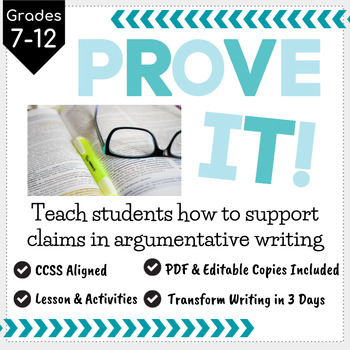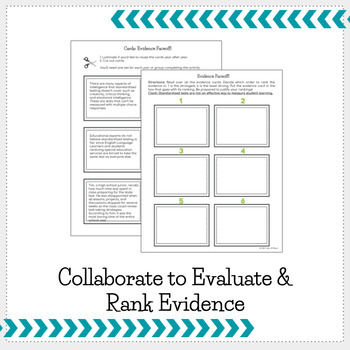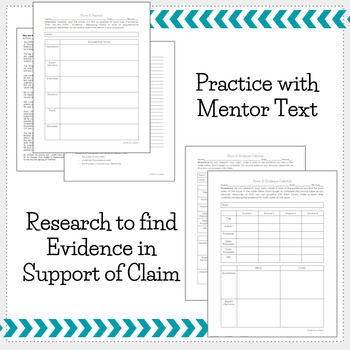Prove It! Teach Students to use Evidence to Support Argument Claims
- Zip
- Internet Activities
What educators are saying
Description
Teaching students to meet the Common Core’s expectations for argumentative writing can be a challenge. Teenagers seem very skilled at making claims (perhaps due to their natural inclination to having very strong opinions!?), but seem to struggle to find and use effective evidence to support those claims.
This 3-day lesson is designed to ease students into using evidence to support claims. Students first learn to identify and evaluate the six main types of evidence before being asked to find evidence on their own using the internet.
What’s included:
✔ Lesson Presentation
✔ Notes and Examples
✔ Evidence Ranking Cards
✔ Student Practice
✔ Article for Student Practice
✔ Evidence Collector version 1
✔ Evidence Collector version 2
✔ Teacher Guide
*You will receive PDF copies as well as digital copies through Google so that you can edit or assign digitally if you'd like*
Objectives:
★ Define and provide examples for the six types of argumentative evidence (quotations, expert opinions, anecdotes, statistics, facts, and examples).
★ Evaluate effectiveness of evidence
★ Identify evidence used in mentor text
★ Use evidence to construct effective argumentative paragraph
★ Research evidence in support of a claim
Common Core State Standards
~ Writing 1: Use relevant and strong evidence to support argumentative claims
~ Writing 7: Conduct short research assignments
~ Writing 8: Gather and compare information from multiple sources
~ Reading Informational Text 8: Identify and evaluate evidence given in text sources
*****NOTE:*****
You will need a Google Drive account to access the digital/editable files!
Students will need internet access to complete part of this lesson!
*****************************************************************************
Customer Tips
~ Get credit toward future TPT purchases by going to your Purchases page and leaving feedback. In addition to getting credit, your feedback helps me know what I'm doing well and what I can improve on (which is greatly appreciated)!
~ Be the first to know about new resources and promotions by clicking the Green Follow Me button next to my store logo. :)
~ Email me if you have any questions, comments, or concerns. I'd love to hear from you!





